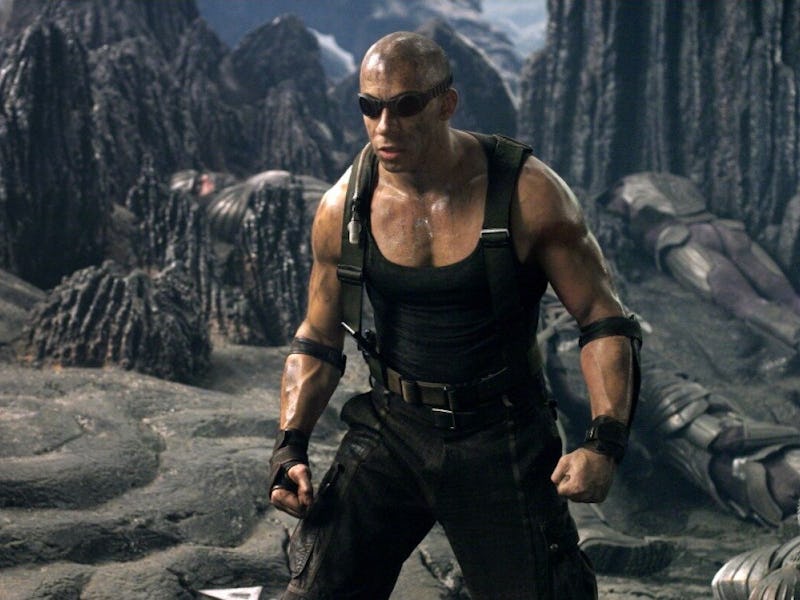The Next Riddick Movie Needs to Learn the Franchise’s Most Important Lesson
Monsters good, space politics bad.

Vin Diesel may fuel the multi-billion dollar Fast and the Furious franchise, and he may have had a notable death in Steven Spielberg’s Oscar-winning Saving Private Ryan, but Pitch Black is the greatest Vin Diesel showcase. David Twohy’s 2000 space-bound creature feature is a monster movie classic, pitting an animalistic Richard Riddick (Vin Diesel) against a planet full of flying critters who have destroyed everything on the surface. The film launched a multimedia franchise, but its immediate sequel, The Chronicles of Riddick, pivoted to space opera and was a critically-maligned box office disappointment. There are promising elements, but Chronicles’ fundamental flaw is simple: Riddick is simply a far better protagonist for monster movies.
Pitch Black begins with a damaged spaceship being forced to land. Its unfortunate occupants crash on a planet experiencing a rare eclipse of its three suns, which releases a horde of carnivorous, flying beasts. The survivors’ only hope lies in Riddick, a dangerous criminal who can see in the dark.
Just like how Superman’s core is hope, and the Hulk is defined by anger, Riddick’s essence as a protagonist is his animalism. The opening minutes of Pitch Black make this clear as Diesel’s raspy voiceover introduces us to the character. “They say most of your brain shuts down in cryo-sleep, all but the primitive side,” he tells the audience. “The animal side... no wonder I’m still awake.” This is why he works so well as a creature feature protagonist. He understands them. Hunts like them. When you see Riddick fighting a space beast, you’re watching two predators in combat.
Four years later, The Chronicles of Riddick instead placed him at the center of a dark space opera in opposition to the Necromongers, a death-worshipping human offshoot. While the film maintains Riddick’s animalism, it’s a striking tonal pivot from Pitch Black’s simplicity. The imperialistic Necromongers, who view life as an abomination and seek rebirth in a constellation of dark stars called the Underverse, seek to subordinate all humans across the galaxy. Their leader, Lord Marshall (an intimidating Colm Feore), also wants to destroy Riddick, a survivor of the Furyan race, as the Necromonger leader has tried to exterminate them ever since he received a prophecy that a Furyan would kill him.
Some men monger fish. Lord Marshall mongers death.
That’s a lot of lore just to explain why death-worshipping zealots have a grudge against Riddick, but Chronicles does make several interesting achievements in its expansion into space opera territory. Its bleak concept of humanity’s future offshoots, like the calculating Elementals or the powerful Furyans, is intriguing. The cast is surprisingly strong (any time you have Dame Judy Dench, Karl Urban, and Keith David, you’re doing something right), and there are some great pulpy moments. Lord Marshall rips a soul from a body! Riddick befriends a deadly, color-changing space beast! But all that lore never coheres into a well-built world, and it’s hard to escape the feeling that Riddick doesn’t quite make sense in it.
Chronicles ends with Riddick atop the Necromonger throne, a boilerplate ending that doesn’t consider who the star character is. Riddick isn’t a leader. He doesn’t gain allies or inspire the masses to rebel against Necromonger rule. He doesn’t have a competing vision for the empire, or seek to defend the value of life against a death cult. He simply wins a duel (the Necromongers have oddly contrived rites of political succession). Riddick is an animalistic, individualistic anti-hero, a survivalist with an occasional virtuous streak. He wouldn’t want the throne. Twohy’s 2013 follow-up Riddick confirms as much, beginning with Riddick once again on a dangerous world after leaving his Necromonger leadership role. He’s on the run, fighting monsters, in a smart, back-to-basics sequel.
The baroque space opera has its moments, but Riddick never feels like the right man for it.
Despite having his name in the title, Riddick is ultimately the wrong protagonist for The Chronicles of Riddick’s world. He’s no leader, revolutionary, or savior, but he doesn’t need to be Aragorn to be a good character. At their best, characters like Riddick solve one of humanity’s most primal fears. He’s the one taking the night watch, fighting the things that go bump in the night. That animalistic intensity works best when he’s combating creatures or being hunted by mercenaries, because Riddick is a bit of a monster himself. With Riddick: Furya begining production soon, it would do well to learn Chronicles’ lessons. Riddick movies should just let the character do what he does best: fight beasties. The deadlier, the better.